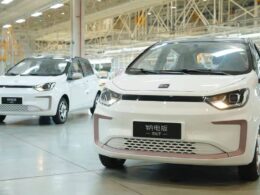The Indian government has taken a significant step towards becoming a global hub for electric vehicle (EV) manufacturing. A recently approved policy aims to attract leading EV manufacturers by offering a mix of incentives and requirements.
Investing in the Future
The policy sets a minimum investment threshold of ₹4,150 crore (around USD 500 million) with no upper limit. This ensures a substantial commitment from companies seeking to establish manufacturing facilities in India. Additionally, companies will have three years to set up production and achieve 50% domestic value addition within five years. This domestic value addition (DVA) will gradually increase, reaching 25% by the third year.
Balancing Imports and Growth
To facilitate technology transfer and initial market entry, the policy allows for limited imports of EVs at a concessional customs duty of 15%. This benefit is available for five years, with a condition – companies must establish domestic production within three years. The total number of imported EVs is capped at 40,000, ensuring a smooth transition towards domestic manufacturing.
Transparency and Safeguards
The policy emphasizes transparency by requiring companies to back their investment commitment with a bank guarantee. This guarantee protects the government’s interests in case companies fail to meet the minimum investment or DVA targets.
A Multi-Pronged Approach
This policy offers a comprehensive approach to fostering a robust EV ecosystem in India. By attracting global players, India aims to:
- Provide consumers with access to cutting-edge EV technology.
- Boost the “Make in India” initiative by promoting domestic manufacturing.
- Encourage healthy competition among EV manufacturers, leading to increased production volumes and economies of scale.
- Reduce reliance on crude oil imports, thereby lowering the trade deficit.
- Improve air quality, particularly in urban areas, by promoting cleaner transportation.
- Create a positive impact on public health and the environment.
The Indian government’s EV policy is a strategic move to position the country as a leader in the global EV market. With its focus on attracting investment, promoting domestic manufacturing, and fostering technological advancement, this policy has the potential to revolutionize India’s transportation landscape and contribute to a cleaner and more sustainable future. The policy could bring a wider range of electric vehicles, including those from Tesla, BYD, Lucid, and Rivian, to Indian consumers.










